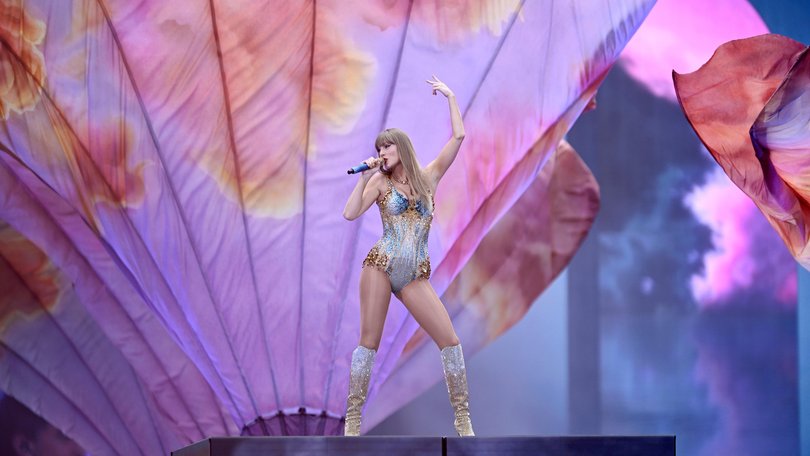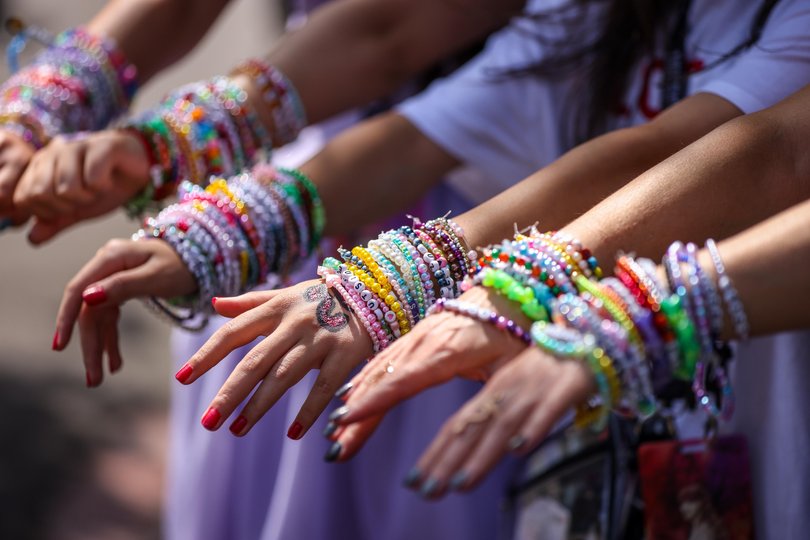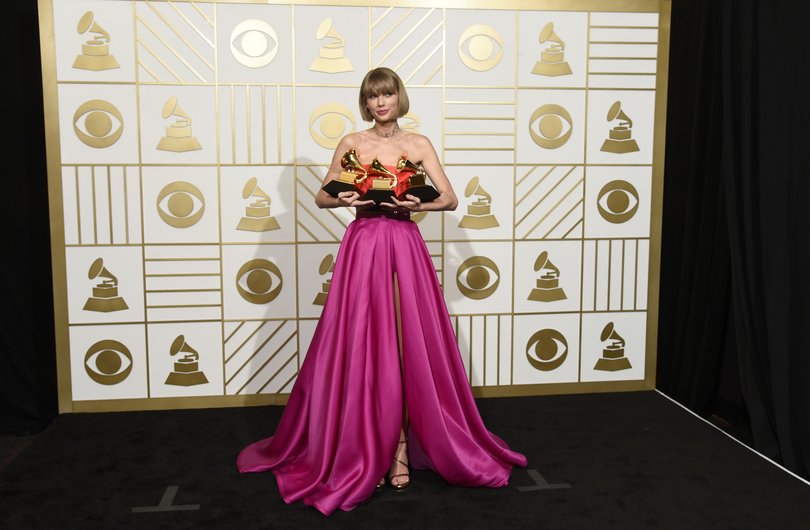The Economist: Taylor Swift, record label disputes and the ruthless rise of an empire
Think you know the story of how Taylor Swift took on the music industry? The reality is more complicated.

Is there anyone on Earth who hasn’t heard of Taylor Swift? To the delight of millions and the chagrin of more it has become difficult to avoid her. Between March 17 2023, when her money-printing Eras tour began, and February 11 2024, when news sites live-blogged her flight across the Pacific to watch her beau play in the Superbowl, the New York Times published more than 1000 pieces that mentioned the singer, only slightly fewer than those that mentioned Joe Biden, the president of the United States.
When I pick up my phone, social-media algorithms bombard me with clips of Swift performing in a sparkly gold leotard. When I put it down, I overhear conversations about her. On a train from Washington DC to New York earlier this year, a cluster of young women were debating whether the government had rigged the biggest American football game of the year so that “Taylor’s boyfriend” would win.
Like many others, I’ve found myself marking time with the milestones of her career. Her album Folklore, which she released in July 2020 to universal acclaim, offered a welcome respite from lockdown boredom. In November 2021, the day after I got engaged, she released a re-recording of Red, one of her early albums. My fiancé and I listened to it as we made hummus and baked a cake for a party we were hosting that evening.
Sign up to The Nightly's newsletters.
Get the first look at the digital newspaper, curated daily stories and breaking headlines delivered to your inbox.
By continuing you agree to our Terms and Privacy Policy.And yet a mere five years ago I was largely immune to her charms. I liked her biggest hits, but I had never listened to an album from start to finish. (I’m not alone in my newish enthusiasm: at the end of 2019 there were around 80,000 members of the Taylor Swift subreddit. Now there are 2.8 million.) The brilliance of Folklore played a part, but it was when Swift began to re-record her old albums that I really got hooked.
Fans will be familiar with the reason the singer remade her old works. In 2005 the preternaturally gifted teenager from Pennsylvania was signed by Big Machine Records, a Nashville-based label owned by Scott Borchetta. Swift recorded six albums with them. Under the terms of her contract, Big Machine kept the rights to the “masters” (the original recordings) of her albums.
As Swift grew more successful, she became frustrated that she didn’t own these. Although she got modest royalties from her songs, she wasn’t earning as much as she would have if she had owned the masters outright. And she didn’t have full control over how her songs were used.
In a message to her fans on Tumblr, Swift said that she had “pleaded for a chance to own (her) work” while she was negotiating a new contract with Big Machine. She claimed the label had instead offered her the opportunity to “‘earn’ one album back at a time, one for every new one (she) turned in”. She walked away. In 2018 she signed with Republic Records, a label owned by Universal Music Group. Being an established star rather than an ingénue increased her bargaining power. Universal agreed that Swift would own the masters to her new albums.
As for the masters of her old albums, Swift initially appeared to have made peace with the fact that she couldn’t buy them back. Borchetta said she texted him: “Owning my masters was very important to me, but I’ve since realised that there are things that mean even more to me in the bigger picture. I had a choice whether to bet on my past or to bet on the future and I think knowing me, you can guess which one I chose.”
That peace ended in 2019 when Borchetta sold Big Machine to Ithaca Holdings, a company owned by Scooter Braun, a music-industry entrepreneur who had discovered Justin Bieber. Swift hated Braun, whom she described as a bully. “Never in my worst nightmares” did she imagine the firm would be sold to him, she wrote on Tumblr. In 2020 Braun sold the masters to Shamrock Holdings, an investment firm owned by the Disney family (Big Machine, now owned by HYBE, a South Korean company, continues to earn royalties as the distributor of the songs).
A furious Swift began to re-record the albums with Universal. It turned out to be a masterstroke, ushering in a period of dominance that has been eye-poppingly lucrative for Swift and her team – let’s call them Taylor Inc. Of the singer’s reported $US1.3bn wealth, approximately 75 per cent of it has been made in the past five years.
So far she has re-released four of the six albums, as well as treating her fans to unreleased tracks from her back catalogue (so-called “from the vault” songs). They have sold almost as well as the new works she has recorded with Universal. The frequency of releases has stoked the frenzy: before 2019 Swift put out an album roughly every two years, as is typical for recording artists. Since then, thanks to the re-recordings (and her phenomenal productivity during the pandemic), she has released a new or re-recorded album at least once a year.

Many Swifties refuse to listen to the original recordings, deeming it unseemly, and refer to the masters as having been “stolen” from Swift. This is an odd interpretation. It’s common practice for record companies to own masters rights. The production of Swift’s early work was a combined effort between the singer and her label, which invested money and time in her when she was relatively unknown. (Consider how little sympathy people might have for the idea that venture-capital investors had stolen a tech founder’s firm.) There are also signs that the real story behind the masters dispute may be more complicated than her fans believe.
Until her fight with Big Machine, Swift’s career had followed a familiar trajectory. Her first album, Taylor Swift, owed much to traditional country music. It achieved some chart success and led to her touring with bigger artists as an opening act. Her poppier second album, Fearless, propelled her into the mainstream, winning a Grammy for album of the year, the music industry’s most prestigious award. She started spending more time in Los Angeles and began working with pop producers.
In February 2016 she won her second album of the year Grammy for 1989. But a few months later Swift would make headlines for the wrong reasons after she complained about an unflattering reference Kanye West had made to her in one of his songs. (Their “feud” had begun in 2009 when West crashed the stage at an awards ceremony to say that Swift’s prize should’ve gone to Beyoncé instead.) Testy exchanges ensued and Swift was trolled by fans of West and his then-wife, Kim Kardashian.
Things got worse for Swift. Her next two albums, Reputation and Lover, had lukewarm receptions from critics and fans, and both failed to be nominated for an album of the year Grammy. By 2019 it seemed as though the best of Swift’s career might be behind her. She was perhaps a couple more weak albums away from a residency in Las Vegas, where fading stars go to trot out their greatest hits.
The dispute over the masters would help change everything. From the beginning, Swift controlled the narrative. She painted herself as a victim, taking on the music industry that had wronged her. In Taylor’s version, her desire to buy back her masters was thwarted twice: first by what she suggested was an unfavourable one-in-one-out deal offered to her by Big Machine, and then by unreasonable demands she said Braun had made after he bought the label from Borchetta.
The real picture appears to be more complex. In 2019, after Swift complained about the sale of Big Machine, Borchetta published online what he said was an extract from a document containing discussions over a draft contract between the company and Swift. It suggests that Big Machine was willing to hand over the masters rights to Swift, though the terms were not included in the extract.
Below the post, Borchetta said it was “part of our official last offer to Taylor Swift to remain at Big Machine Records and that 100 per cent of all Taylor Swift’s assets were to be transferred to her immediately upon signing the new agreement”. (In response, one of Swift’s lawyers, Donald Passman, told People magazine that Borchetta “never gave Taylor Swift an opportunity to purchase her masters, or the label, outright”.)
In 2020 Swift claimed on Twitter that Braun had refused to enter into negotiations unless she signed an “ironclad NDA (non-disclosure agreement)” that would have prevented her from discussing him in anything other than a positive light. She said her legal team likened it to those used to silence accusers of assault.
Such an NDA may have been floated by Braun during negotiations, but it does not appear to have been a precondition to them. In 2023 Music Business Worldwide (MBW), an industry magazine, saw a copy of an NDA signed by Jay Schaudies, Swift’s lawyer, and Braun. Its terms were fairly standard, restricting parties from discussing only the details of the deal. (According to emails seen by MBW, the more restrictive NDA was proposed later in the negotiations, but when Swift did not want to sign it, Braun dropped it.)

Employees at Ithaca, Braun’s holding company, told MBW that during the negotiations Braun offered Swift her masters for $US300m (a source close to her denied she was given this opportunity). If this is true, it is not clear that Swift could have afforded her masters at that price. According to Forbes she was worth $US365m in June 2020 – a large slice of which was probably tied up in her property portfolio, which was then worth around $US100m. She could have borrowed the money against her assets, but she would have had to risk almost her entire net-worth.
We are unlikely to find out all the details of what happened during Swift’s negotiations with Big Machine. But the material posted by Borchetta and MBW’s reporting suggest there are layers of nuance behind the clear-cut story Swift has told her fans.
She is not the first musician to complain about the ownership of their masters. Both Prince and Paul McCartney expressed similar frustrations. Others, such as Dua Lipa and Rihanna, have simply bought theirs back. Plenty of artists issue anniversary editions of albums; some release new versions or “remaster” old works (a process that improves the sound quality of older songs). None has received as much attention or acclaim as Swift.
It is hard to overstate the importance of the story as she told it in the eventual success of the re-recordings and the Eras tour. The Swifties’ image of their idol – a woman standing up to the male-dominated music industry – protects her even when things go wrong. Take the Ticketmaster fiasco in 2022, when many fans were left distraught after missing out on the chance to see the Eras tour. Taylor Inc wanted a large number of tickets to be sold at once in order to make the biggest possible splash. Ticketmaster’s website crashed and fans directed their ire at the platform. (Swift said the company had assured her the demand could be handled and Ticketmaster apologised to her.)
Taylor Inc has a knack for turning a bad situation to its advantage, while others sometimes take the rap. This deftness – some might say ruthlessness – has shaped its strategy from its earliest days.
Miss Americana, a documentary about the singer, includes a clip of a young Swift singing at the opening ceremony for the US Open tennis championship. “And now to perform the national anthem,” says the announcer, as grainy footage shows her walking through the bowels of a stadium, “a multi-talented performing artist from Reading, Pennsylvania. Please welcome…Taylor Swift!”
The US Open’s entertainment director sent the schoolgirl’s demo tapes to Daniel Dymtrow, who helped manage Britney Spears. Dymtrow realised Swift had something special. He became her manager in 2003, after which she quickly landed a development deal with RCA, a highly regarded record label in Nashville. In 2004 her parents Scott, a banker at Merrill Lynch, and Andrea, decided to move the family to Music City for the sake of Taylor’s career.
In an email in 2005, Scott Swift appears to credit Dymtrow for facilitating the move. “I always tell you but thank you so much for making our lives magical. We wouldn’t be in Nashville if it wasn’t for you.” But later that year, Dymtrow was summarily dropped as her manager. A few weeks later, Swift signed the deal with Big Machine, a newly formed label.
Dymtrow, who felt he had been ripped off, sued the Swifts for various alleged infractions, including “unjust enrichment”. In his legal complaint Dymtrow said the Swifts had promised to “reward him for his efforts, treat him fairly, and protect his economic interests”. He said that he had been paid less than $US10,000 in total for managing Swift.
Dymtrow claimed he had been instrumental in getting the deal – that it was he who sent Swift’s demo tapes to Borchetta. The judge decided there was sufficient evidence that Dymtrow had been wronged not to throw out the claim of “unjust enrichment”, and the parties settled out of court.
The case gives us an insight into the tactics of Taylor Inc – and reveals the instrumental role played by Scott Swift. In another email presented to the judge, Scott Swift boasts to Dymtrow about his own career (“I am in the top 1 per cent of brokers in the world”) before talking about the money he has spent on his daughter’s rise to stardom (including $US200,000 he allegedly forked out to move his family to Nashville). In the seven-page stream of consciousness, one sentence stands out: “I am going to do anything that I think is appropriate to do to advance Taylor’s career.”
What Scott Swift deemed appropriate is anyone’s guess. At the time of the court case, the press seized on some disturbing comments in an email that Scott Swift had sent to Borchetta. “Enough with the Dymtrow. You asked me to break both his legs, wrap him in chains and throw him in the lake. I did.”
Taylor Inc remains a family business. Swift and her family are in charge of her tours, fan clubs and rights management. In 2006, before Swift had even released her first album, her family established a company called Firefly Entertainment to oversee her affairs. Today this handles her personal services: hiring drivers, dealing with estate agents and managing her private jet.
New companies were formed to deal with each stage of her career. In February 2008, more than a year before she embarked on her first stadium tour, Taylor Swift Productions was set up. This company has been credited on most of her concert movies and music videos. In 2009 came a fan club and a company called 13 Management, seemingly an umbrella entity that runs everything. A merchandising company was founded in 2010, followed a year later by a company to manage trademarks and copyright.
At least 16 corporations now make up Taylor Inc. In addition to the six entities linked to her career, there are seven relating to her investments, mostly property. Three relate to her private jet (until February 2024 she owned two planes, but has since sold one). Scott Swift is listed as an adviser or has power of attorney for almost all of these companies. Because he still works as a broker, he is obliged to disclose his business interests and positions to financial regulators.
Despite this sprawling empire, the number of people who can be linked to these entities is small. Swift’s inner circle includes her parents, brother, Frank Bell (radio manager), Robert Allen (tour manager) and Douglas Baldridge (lawyer) and a personal assistant. Many of them have been with her for her entire career. Her publicist, Tree Paine, runs her own firm, Premium PR – Swift appears to be her only client.
Much of this is highly unusual. Billie Eilish, Ariana Grande and Olivia Rodrigo, all huge pop stars, do not have their own management companies or deal with all their business affairs in-house. Most artists leave the details to external teams or their record labels. That Swift has retained such a tight hold over her interests since the beginning of her career might help explain her longevity. She is surrounded by people whose livelihoods depend on her, not a portfolio of artists, doing well. This breeds loyalty and makes it easier to keep control of the narrative.
No one cares about the character of hedge-fund managers or private-equity tycoons, as long as they are making money. The genius of Taylor Inc is the ability to pursue sharp business tactics, while at the same time being careful not to undermine Swift’s wholesome image. This is critical given she makes her living writing songs about the frailties of the human condition: love, heartbreak, betrayal. It is a balancing act borrowed not from Wall Street but from politics – one that even Machiavelli could admire.
